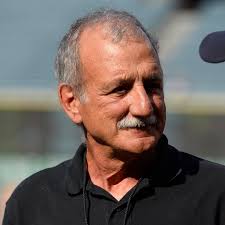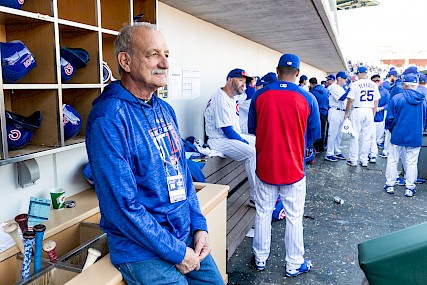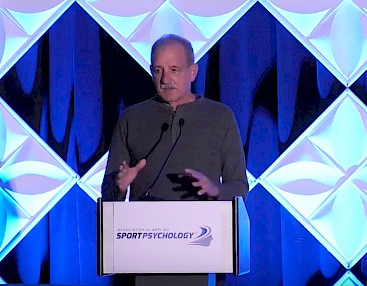Kenneth Ravizza

On July 9, 2018, many of us were shocked and saddened to hear about the sudden passing of one of the greatest practitioners and true pioneers in the field of applied sport psychology, Ken Ravizza. One of the enduring qualities about Ken is he had a unique comforting interpersonal quality that would immediately connect and put people at ease. Didn't matter where you were: conference, athletic venue, he was always the same Ken. We all remember that voice, that greeting that would bellow from the diaphragm "Yuuuuke, how's it going" that would resonate warmth, positivity, and trust. He had that special "it" factor that was welcoming and empowering. No matter what your educational background or level of talent, Ken was generous with his time and interested in what you had to say. One memory that speaks to this issue was almost 30 years ago, a group of applied sport psychologists including Ken met in Utopia, Texas to brainstorm ideas and chart directions for applied interventions. I remember Ken holding court, floating down the Utopia River slowly in an innertube as Ken held court pontificating about the merits of a new model that ultimately became the foundation for one of his signature interventions: "The R's". From that weekend came many laughs, robust camaraderie, and an amazing peer network that can always be counted on to provide strong emotional/social support when needed.
 I feel so fortunate to have forged a close personal and professional relationship with Ken the past 40 years; he was the most compassionate, warm, sincere, heartfelt caring person I have ever known. A great listener who understood the importance of context in consulting, Ken was simply the best at bringing out the best in others. I fondly referred to Ken as my "Yoda": wise, insightful, innovative, creative, skilled at making the complex simple (a term he and Chicago Cubs Manager Joe Maddon coined was the word "Simplexity"). Some examples of Ken's "Ravizzaisms" that reflect keeping things simple include: "Breathe"; "Get Comfortable being Uncomfortable"; "The Zone is Overrated, rather, Compensate and Adjust". He also introduced techniques to heighten self-awareness and increase self-control such as the "R's"; "Routines and Focal Points"; the "Signal Light" metaphor; the miniature toilet in the dugout to symbolize "Flush it", get to the next pitch. Two other reflections that come to mind include the gestalt technique he demonstrated one year at AASP role playing being the "Monkey on your back" to symbolize that person is thinking too much under pressure and in particular, the wrong thoughts; and the story he shared at AASP about going to the store the morning of the College World Series Championship Baseball game, buying a key chain with a small ball on it to symbolize how small the ball is going to look to the hitters if they don't manage the moment properly.
I feel so fortunate to have forged a close personal and professional relationship with Ken the past 40 years; he was the most compassionate, warm, sincere, heartfelt caring person I have ever known. A great listener who understood the importance of context in consulting, Ken was simply the best at bringing out the best in others. I fondly referred to Ken as my "Yoda": wise, insightful, innovative, creative, skilled at making the complex simple (a term he and Chicago Cubs Manager Joe Maddon coined was the word "Simplexity"). Some examples of Ken's "Ravizzaisms" that reflect keeping things simple include: "Breathe"; "Get Comfortable being Uncomfortable"; "The Zone is Overrated, rather, Compensate and Adjust". He also introduced techniques to heighten self-awareness and increase self-control such as the "R's"; "Routines and Focal Points"; the "Signal Light" metaphor; the miniature toilet in the dugout to symbolize "Flush it", get to the next pitch. Two other reflections that come to mind include the gestalt technique he demonstrated one year at AASP role playing being the "Monkey on your back" to symbolize that person is thinking too much under pressure and in particular, the wrong thoughts; and the story he shared at AASP about going to the store the morning of the College World Series Championship Baseball game, buying a key chain with a small ball on it to symbolize how small the ball is going to look to the hitters if they don't manage the moment properly.
A lifelong teacher and educator at heart, Ken had a special gift of reaching out and connecting with people on a genuine, authentic, interpersonal level. Whether you were a student at a conference or a professional colleague, Ken intrinsically took interest in you as a person and wanted to learn as much as he could about your unique journey/story. He genuinely cared about what you were doing and offered insight and perspective based on his years of experience. In talking with colleagues about what made Ken so special, his authenticity, transparency, even keel temperament, and comfort being himself in any given situation was empowering and transformational. One of the greatest attributes about "Ken being Ken" is he inspired people to find their own path and be comfortable and confident being their true authentic self.
Ken had a very distinguished professional career both as a professor and consultant. A Physical Education major throughout his educational career, Ken received his Bachelor of Science Degree in 1970 from Springfield College, his Masters of Science Degree (1972) and PhD (1974) from USC. Upon graduating from USC, he spent four years as an Assistant Professor at the State University College of New York in Brockport before moving to Cal State Fullerton in 1977 where he became a full professor teaching classes and mentored graduate students for 40 years, developing one of the best hands on applied sport psychology programs in the country. Former graduate student and current AASP Executive Board member Angie Fifer had this to say about Ken:
"He was an educator always teaching. I served as Ken's TA for three semesters, and even though it was the same class, I learned something new every day. Ken pushed us to ask thoughtful questions and deepen our knowledge from his years of experience. My favorite was walking with Ken to his classes. He got stopped so many times along the way and took a moment to connect with and remind the student to keep "Working it". We were always late to class because of just how many students wanted to say hello".
As a consultant, Ken worked with a variety of intercollegiate athletic departments,professional sport organizations, and Olympic Teams including Cal State Fullerton, UCLA, Nebraska, the Chicago Cubs, Tampa Bay Rays, Los Angeles Angels, New York Jets, USA Volleyball, Baseball, Softball, Field Hockey, Water Polo to name a few. providing individual and team consultations in the areas of motivation and stress management, mental skills training and coping strategies for managing performance effectiveness in sport, as well as working very closely with coaches offering perspective when asked and strategies for enhancing team culture. Ken was one of the most sought-after consultants in our field and his seminal 1987 TSP article about Gaining Entry and Developing Trust is a classic everyone in our field should read, along with Heads Up Baseball 2.0 he wrote in collaboration with long-time friend Tom Hanson. From a mental training perspective, Ken inspired students, athletes, coaches and teams to believe in themselves, take responsibility and ownership for their mental game, and be committed to the process of being the best competitor they can be in the present moment right here, right now.
 In writing this memorial to Ken, I couldn't do it alone, what follows are some reflective comments from AASP colleagues who were close with Ken over the years (affectionately known as the Utopia Group)
In writing this memorial to Ken, I couldn't do it alone, what follows are some reflective comments from AASP colleagues who were close with Ken over the years (affectionately known as the Utopia Group)
Rich Gordon - Ken was absolutely the best in our field at being innovative with coaches and athletes. He could give just enough without overstating the message. He was a true pioneer in our field. He came in on the ground floor of applied sport psychology. For 40 years, he was my friend and friends with many. His influence will never fade ... when he was with you, he only cared about you, and you felt it!
Gloria Balague - The world is a bit darker without Ken. His kindness, his wisdom, his sense of humor and his honesty were an amazing combination. Ken was probably the original mindfulness practitioner (in the 60's and 70's Ken was into Yoga, stress management and relaxation activities brought to athletics) the whole concept of BREATHE was part of his daily orientation with athletes and teams (BE HERE, BE PRESENT, FOLLOW YOUR BREATH).
Rick McGuire - Maybe the best applied practitioner that ever lived and his training was not even in counseling or psychology (philosophy and physical education), he is using the same stuff he learned in the late 60's and early 70's - his persona and foundational beliefs resonates with today's coaches and athletes. He is an educator at heart, truly a coach's coach!
On a personal note, more than three weeks after his death, words cannot truly convey the hurt I continue to feel (and yes Ken, I know I have to feel the pain to truly understand). But beyond the pain and grief, I am so grateful for Ken's love, friendship, insight, and inspiration that he provided me. Your spirit and teachings will continue to resonate with me and others for years to come.
Written by Dave Yukelson



